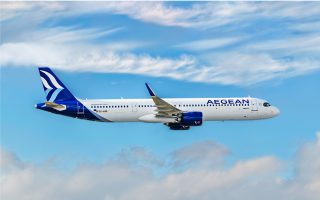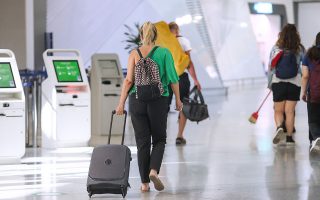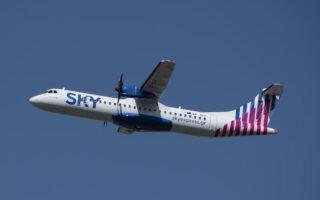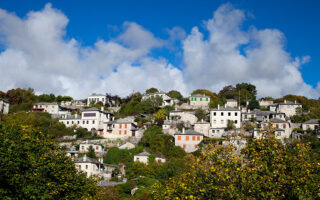Demand for travel keeps increasing, says KLM’s CEO
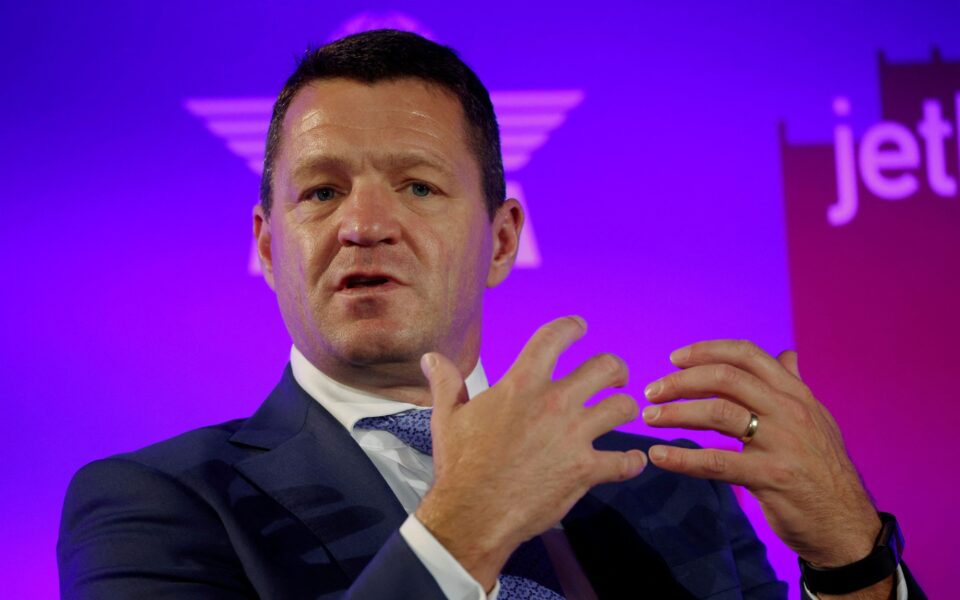
For Pieter Elbers, the chief executive of KLM (the Dutch arm of Air France-KLM) for the last eight years, the most difficult period was not while the planes were in the air, but when they were grounded due to the Covid-19 pandemic.
Speaking to Kathimerini in one of his last interviews as CEO, the 51-year-old, who was recently in Athens at a joint KLM-Air France event for the shipping industry, said the crisis faced by airlines in the last two years was the biggest since World War II.
In this unfavorable environment, the crews looking for alternative means of transportation increased while the demand for air and sea transportation rose, with KLM specializing in the movement of crews and marine executives (Marine & Offshore Travel).
However, the systemic risk posed by Covid-19 in aviation seems to have abated, with rising costs and price increases now being the immediate priority.
Three questions to start with: What is the relationship between KLM and the shipping industry? What does the group’s flight schedule for Greece look like this summer? And how important is the Greek market for Air France-KLM?
KLM has a very long and deep relationship with the shipping industry. Especially here in Greece the history goes a long, long way back. I have experienced that myself when I lived and worked in Athens for KLM over 20 years ago, but it goes back much further. Even today during the Marine event we had in Athens, I received a beautiful copy of a KLM advertisement back in 1969 concerning the marine business. Isn’t that great?
Also recently, during Covid, the marine industry was of great meaning and importance to our company. That was due to the fact the marine industry again appeared to be one of the really vital parts of the world economy. The crews on board the ships, the shipowners, the management companies, the travel agencies, everyone had a very tough time. KLM was there for them with flights, our route network and our teams in Greece and all over the world. To allow seagoing vessels to operate, seafarers’ travel was essential. KLM played a vital role in these processes and is very proud and committed to still do so.
Next to that, connecting the region to other important economic regions inside and outside of Europe is of great importance to KLM, for the business as well as the leisure market. Together with Air France, Delta Airlines and also Transavia, we are offering a great amount of destinations and capacity to the Greek market, with Athens being a solid base in KLM’s network for decades.
How do you expect the airline industry and tourism to perform this year? When do you expect them to make a full recovery and how do you see the war in Ukraine affecting them?
In these last months, we have been seeing a continuous recovery of air travel, with more and more countries lifting travel restrictions. Initially it was mostly the return of leisure and essential travel (such as seafarers); now we are also seeing a return to business travel.
‘Over the past two years we’ve faced the biggest crisis in the history of airlines after the Second World War’
To us, lifting those restrictions is of course very important and we expect governments will continue to do so now that vaccines and knowledge of the virus are becoming more and more available. As I said, the positive news is also that we are seeing business travelers returning. Many business customers choose KLM precisely because of the broad portfolio of destinations offered by its network. We are also expanding the products we offer, by introducing our Premium Comfort product, available on our aircraft later this year.
Overall the expectation is that 2022 will again be a better year for our company than 2021 was. And 2021 improved compared to 2020. KLM has accordingly responded by expanding capacity on European routes by 10% compared to last year, almost matching the 2019 pre-pandemic level. This summer KLM will be serving 167 destinations, of which 96 are in Europe and 71 intercontinental.
On the other hand, we still face a lot of challenges, especially given the terrible and heartbreaking situation in Ukraine. For example, at this point in time, we are serving several destinations in Asia again, rerouting our flights to Asia under Russia and now over Kazakhstan. Different routes and extra flying time of course impact our cost level on those flights as well.
How likely is an increase in fares due to the oil price surge?
We have had no other choice than to raise ticket prices because of growing costs. The price of kerosene, for example, is correlated to the global oil prices. We have witnessed rising oil prices due to global developments and geopolitical situations. As airlines, we are using the system of hedging to curb increases. But unfortunately, raising our ticket prices in some cases is necessary. For example, a flight from Amsterdam to New York will cost approximately 30 euros extra. This is because of the bigger impact of the rising fuel prices on those specific flights, but also because of rising prices in other segments of business – not just fuel. Higher ticket prices are at this point in time applicable on all long-haul destinations and some medium-haul routes.
Could you describe your experience during the Covid-19 pandemic and what hard decisions had to be made? How agile is KLM?
Over the past two years we’ve faced the biggest crisis in the history of airlines after the Second World War. During the pandemic, we had to cut down capacity whilst meanwhile maintaining as many routes as possible. Can you imagine, we fell from some 120,000 customers per day to just a couple of thousand per day at the beginning of the pandemic.
At the same time we sadly had to say goodbye to thousands of dedicated KLM staff. That’s never easy. On the other hand, colleagues had to work hard in difficult circumstances. During that period, I’ve seen what makes KLM staff stand out – being committed and showing great solidarity.
We worked relentlessly to fulfill our role as a key player in delivering vaccines across the world thanks to our extensive expertise and network. We innovated and adjusted, for example by transporting cargo in cabins. We’ve secured a financial package with credit facility and loans to strengthen the future of our company – loans we will of course repay. And we’ve won awards, such the APEX award, one of the biggest awards in the airline industry, because of our achievements in areas such as safety well-being and sustainability.
Aviation will be one of the main forces behind economic recovery and we have shown that we can and will lead the recovery.
What is your strategic plan in the post-Covid era?
KLM was profitable prior to Covid-19, proving its sound and solid business model works. Strong airlines have maintained their scale more effectively than weak ones, and KLM is one of the strong ones, with Schiphol being one of the busiest hubs during the pandemic, due to our strategy to fly where we can, as long as variable costs are covered.
As stated before, demand for air travel is increasing as Covid-19 restrictions are lifted in the Netherlands and other EU countries. KLM has responded by expanding capacity on European routes by 10% compared to last year, almost matching the 2019 pre-pandemic level. We’ve introduced new routes again and also increased or reinstated services to several destinations in and outside of Europe.
Another key aspect of KLM’s post-Covid restructuring strategy, for example, is the further renewal of its European fleet with a new and more efficient generation of European aircraft. From 2023 on, these new A320/1 aircraft will join the fleet of KLM and Transavia. These new aircraft not only produce less noise than the current, older generation of aircraft, but also reduce fuel consumption and CO2 emissions by 15 percent. Adding that lower fuel consumption will reduce costs, and thus create more room for investment in operations for a stronger future.
You are committed to increase sustainable aviation fuel (SAF) blending to 5% in 2030. Why are biofuels important?
The Earth has clear limits as to how we use our resources and the amount of emissions we generate. That is why we put great effort into creating more sustainable aviation. We focus on reducing the environmental footprint, and where that is not an option, we aim for compensation and innovation.
Reducing, for example, is realized by refitting aircraft interiors and products, adding lighter materials and by introducing new and more efficient aircraft, for example our Embraers, which consume about 9% less fuel and produce over 30% less CO2 emissions.
Recently, KLM, together with Air France-KLM and Air France, announced that we are aligning our CO2 emissions reduction targets with the UN Paris Climate Agreement. KLM, together with other airlines, also made an International Air Transport Association (IATA) commitment to net zero by 2050. In the coming period we will focus on the next crucial step, committing ourselves to the CO2 reduction path developed by the Science Based Targets initiative (SBTi), specifically for the airline industry. This will bring our targets further in line with the Paris Climate Agreement.
We also put great focus on SAF. From January on, we have added SAF on all flights departing from Amsterdam. In addition, KLM will offer its customers the option of purchasing an extra amount of SAF. The CO2 emissions of SAF that KLM currently purchases are at least 75% lower than those of fossil kerosene. That is why, in the short term, SAF is so important to drastically reducing CO2 emissions and thus for sustainable aviation.
Meanwhile we need to realize the interdependency within the supply chain. We need aircraft and engine manufacturers to build more sustainable aircraft. We need Brussels to realize the Single European Sky. We need fuel manufacturers to ramp up production of sustainable aviation fuel. And we need our customers to help us finance the sourcing of SAF. I don’t have any doubt that together we’ll achieve our 2030 and 2050 goals of CO2 reduction.
As you are going to step down in July, what are your plans?
I have been privileged to work for KLM for the past 30 years and serve as KLM’s 12th CEO over these last eight years. KLM is a really wonderful company with 102 years of rich and pioneering history, excellent people and loyal customers. It has been such a wonderful and rewarding journey over all these years. Also living in Greece was a fantastic part of my family’s life and we could have that experience whilst being with the KLM Blue Family.
I don’t know yet what the future holds. We’ll see. For now, I am immensely grateful of what I could do and serving KLM as its CEO and remain focused on the job till the very last day. I will hand over with confidence to my successor. Thereafter, a new chapter, a new journey will begin. We’ll see what that holds.
